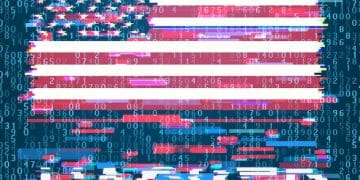US Immigration Policy Changes: A 2025 Guide for Employers

US Immigration Policy Changes: What American Employers Need to Know in 2025 encompasses a complex web of regulations affecting hiring, compliance, and workforce planning, demanding proactive strategies and up-to-date knowledge for businesses operating within the United States.
The landscape of US Immigration Policy Changes: What American Employers Need to Know in 2025 is constantly evolving. Staying informed and compliant amid shifting regulations is crucial for businesses to maintain a legal and productive workforce.
Understanding the Current US Immigration Policy Landscape
The United States immigration system presents both opportunities and challenges for employers. Navigating this complex system requires a thorough understanding of various visa options, compliance regulations, and potential policy shifts.
Let’s delve into the intricacies of current immigration policies and their direct bearing on American businesses.
Key Immigration Categories for Employment
Several visa categories are commonly utilized by US employers to sponsor foreign workers. Understanding these categories is crucial for making informed hiring decisions.
- H-1B Visa: For specialty occupations requiring theoretical or technical expertise.
- L-1 Visa: Allows multinational companies to transfer employees from foreign offices to the US.
- O-1 Visa: For individuals with extraordinary ability or achievement.
- TN Visa: Available to Canadian and Mexican professionals under the USMCA agreement.
These categories each have specific requirements and limitations that employers must carefully consider.

Moreover, ensuring compliance with these regulations is paramount. Regular audits and up-to-date knowledge are essential to avoid penalties and maintain a legal workforce.
Potential Immigration Policy Changes in 2025
Forecasting immigration policy changes is challenging but essential for strategic workforce planning. Various factors, including political dynamics and economic conditions, influence the direction of immigration reform.
What potential shifts might impact employers in 2025 and beyond?
Increased Enforcement and Compliance
A potential shift towards stricter enforcement of existing immigration laws could significantly impact employers. This might involve increased scrutiny of visa applications and workplace audits.
Therefore, companies need to prioritize compliance and ensure their hiring practices are in full accordance with the law.
Changes to Visa Programs
Modifications to existing visa programs could alter the availability of foreign workers. For example, revisions to the H-1B visa program could affect the selection process, eligibility criteria, or wage requirements.
- Review current hiring practices to identify potential vulnerabilities.
- Develop contingency plans to mitigate the impact of policy changes.
- Stay informed regarding legislative proposals and regulatory updates.
Remaining agile and adaptable is crucial in the face of potential policy changes.

By proactively adapting to these potential changes, businesses can maintain a competitive edge in the global marketplace.
Strategies for Employers to Navigate Immigration Changes
Navigating the complexities of immigration policy requires a proactive and strategic approach. Employers can implement several strategies to minimize risk and maintain a compliant workforce.
What practical measures can businesses take to protect their interests?
Enhancing Compliance Programs
Strengthening internal compliance programs is essential for mitigating the risks associated with immigration enforcement. This includes conducting regular I-9 audits, training HR staff, and implementing robust record-keeping practices.
Documenting compliance efforts can provide a valuable defense in the event of an audit or investigation.
Building Relationships with Legal Counsel
Engaging experienced immigration counsel is crucial for receiving expert guidance and navigating complex legal issues. An attorney can provide advice on visa options, compliance requirements, and strategies for responding to enforcement actions.
- Develop a long-term relationship with a qualified immigration attorney.
- Seek legal guidance on complex immigration matters.
- Stay informed about changes in immigration law and regulations.
Regular communication with legal counsel ensures that employers remain informed and compliant.
Working closely with legal experts enables employers to navigate the complex legal landscape effectively.
The Economic Impact of Immigration Policies on US Businesses
Immigration policies have a profound impact on the US economy and the ability of businesses to attract and retain talent. Restrictive policies can limit access to skilled workers and hinder economic growth.
How do immigration policies influence the competitiveness of US businesses?
Access to Skilled Labor
Immigration policies influence the availability of skilled labor across various industries. Restrictive policies can create labor shortages and hinder innovation.
Facilitating the entry of skilled workers can boost productivity, drive innovation, and enhance global competitiveness.
Economic Growth and Innovation
Studies have shown that immigration contributes significantly to economic growth and innovation. Immigrants often bring unique skills, entrepreneurial spirit, and diverse perspectives to the US workforce.
- Advocate for policies that support access to skilled labor.
- Invest in training and development programs for US workers.
- Promote diversity and inclusion in the workplace.
By embracing immigration, the United States can maintain its position as a global economic leader.
Understanding the interplay between immigration and economic prosperity is crucial for shaping effective policies.
Preparing Your Business for Future Immigration Changes
The future of US immigration policy remains uncertain. However, by proactively preparing their businesses, employers can mitigate risks and adapt to change.
What steps can employers take to prepare for the future?
Diversifying Recruitment Strategies
Expanding recruitment efforts to include a wider range of talent pools can reduce reliance on any single source of labor. Exploring domestic and international recruitment options can help employers mitigate the impact of immigration restrictions.
A diversified workforce brings different perspectives and enhances innovation. Consider virtual assistant services for international opportunities.
Investing in Employee Training and Development
Developing the skills of existing employees can help reduce reliance on foreign labor. Investing in training and development programs can equip US workers with the skills needed to fill critical roles.
- Assess current workforce skills and identify gaps.
- Provide training programs to upskill existing employees.
- Foster a culture of continuous learning and development.
Investing in the talent of American workers makes good business sense.
These strategic adjustments position companies for success in a changing regulatory environment.
Advocating for Employer-Friendly Immigration Policies
Employers have a vital role to play in shaping immigration policies that support economic growth and innovation. By engaging with policymakers and advocating for sensible reforms, businesses can influence the future of immigration in the United States.
What actions can employers take to advocate for positive change?
Joining Industry Associations
Collaborating with industry associations and business groups can amplify the voice of employers and advocate for pro-growth immigration policies. These organizations provide a platform for sharing best practices and influencing policymakers.
Collective action is more effective than individual efforts.
Engaging with Policymakers
Directly engaging with elected officials and policymakers can help educate them about the importance of immigration to the US economy. Sharing data and personal stories can help influence their understanding of the issue.
- Participate in policy debates and discussions.
- Share data on the economic impact of immigration.
- Communicate the importance of immigration to your business.
Advocacy is essential for creating a favorable policy environment.
These partnerships create opportunities to advocate for employer-friendly immigration reforms.
| Key Element 🔑 | Brief Description 📝 |
|---|---|
| H-1B Visa 🏢 | For specialized occupations needing technical or theoretical expertise. |
| Compliance Programs ✅ | Enhancing programs is vital for tackling immigration implementation risks. |
| Policy Effects 📈 | Immigration policies notably shape the economy, employment and access to qualified staff . |
| Talent Investment 🧑💼 | Employee investment helps minimise the dependence to foreign personnel . |
Frequently Asked Questions
▼
The main options encompasses H-1B for expert vocations, L-1 for inner-company movements, O-1 for outstanding workers, and TN for Canadian and Mexican professionals. Each has unique requirements.
▼
Employers can maintain compliance by commonly performing I-9 audits, teaching HR employees about immigration rules, and keeping well-maintained employment data.
▼
Immigration policies effect the US economy by shaping the availability of adept staff, impacting rates of economic increase, driving creativity, and enhancing normal competitiveness.
▼
Businesses ought to diversify recruitment efforts, invest in employee education, and cultivate interaction among policymakers to prepare for immigration policy variations.
▼
Industry associations permits businesses to collectively recommend for pro-growth immigration regulations influencing policymakers through shared assets and well designed strategies and techniques.
Conclusion
In summary, understanding and adapting to US Immigration Policy Changes: What American Employers Need to Know in 2025 is paramount for businesses. By staying informed, enhancing compliance, and strategically planning for the future, employers can navigate the complexities of immigration policy and maintain a thriving, diverse workforce.





